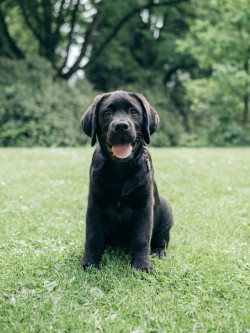German Shepherd
German Shepherd Dog (GSD; German: Deutscher Schäferhund), the breed that is synonym to intelligence, hardiness, confidence and authority.
As the name suggests, this breed of dog is descendent of German origin, originally bred for herding sheep. Serving the breed’s original purpose, German shepherds are capable working dogs that show unmatched valor and devotion towards any tasks at hand.
German Shepherds are also commonly known as ‘Alsatians’, from the British influence in India; and they make up for excellent guard dogs.
German Shepherds are one of the most popular dogs worldwide, mainly because of their temperament and top as one of the most intelligent dogs available in India. The daily active requirement for German Shepherds are couple of hours each day.
German Shepherd Overview
| Official Name | German Shepherd |
| Commonly Known | German Shepherd |
| Height | 22 to 26 inches |
| Weight | 50 to 90 pounds |
| How long lives | 9 to 13 years |
| Social outlook | Good with proper socialization, can be protective of family |
| Temperament | Intelligent, loyal, and versatile |
| Intelligent? | Extremely intelligent and trainable |
| Does it shed? | Yes, sheds moderately year-round with heavier shedding in spring and fall |
| How much exercise do they need? | High exercise needs, require daily physical and mental activity |
| Energy Level | High energy, active and alert |
| Do they bark a lot? | Yes, can be vocal and may bark to alert or communicate |
| Do they drool? | Not known for excessive drooling |
| Breed Group | Herding |
| Standard Breed Size | Large (50-90 lbs.) |
| Coat Length | Medium to Long |
| Colors | Black & Tan, Sable, Black & Red, Black & Cream |
| Coat Patterns | Solid or Saddle |
| Fun facts | Commonly used as working dogs in various roles, including police, military, and service dogs. |
German Shepherd's Adaptability to Indian Culture
The German Shepherd, renowned for its versatile nature and exceptional intelligence, seamlessly blends into the vibrant tapestry of Indian culture. With its innate ability to connect and its adaptable demeanor, the German Shepherd has carved a special place within the hearts and homes of Indian families.
Known for their unwavering loyalty and keen sense of companionship, German Shepherds readily embrace the close-knit bonds that are integral to Indian households. Their intuitive nature allows them to form deep connections with family members, offering unwavering support and companionship through life's journey.
Whether in bustling urban environments or serene rural landscapes, German Shepherds adjust harmoniously to the diverse rhythms of Indian life. Their remarkable adaptability extends to the various roles they fulfill within Indian society, including loyal family protectors, trusted service dogs, and dedicated working partners in fields such as law enforcement and search and rescue operations.
German Shepherds have a natural affinity for human interaction, making them an integral part of cultural celebrations and daily activities. Their presence during festivals, gatherings, and outdoor excursions enriches the experiences and memories of those who share their lives with these majestic companions.
From the serene backwaters of Kerala to the bustling streets of Mumbai, German Shepherds gracefully navigate India's multifaceted landscapes and societal dynamics. Their boundless energy, combined with their ability to adapt to varying climates, makes them equally comfortable accompanying families on leisurely walks or engaging in spirited play.
Embodying the essence of unity and devotion, the German Shepherd has become an emblem of trust and loyalty in the hearts of many Indians. As they forge enduring connections and contribute to the cultural mosaic of India, these remarkable canines exemplify the spirit of adaptability that transcends borders and resonates deeply within the Indian way of life.
In dog nomenclature they are considered moderately active and qualify as self-assured breeds. Given the genetic make-up and behavioral traits, GSDs require to be kept both physically and mentally active.
German Shepherd Puppies Available

Sangfroid Kennels
Sangfroid kennels has a new litter of German Shepherds from great bloodlines. Import and Champion Bloodline Get in touch.
Whatsapp: +91 98607 77723

Boerboel Kennel
German Shepherd puppies with great bloodlines available to go to loving homes. Get in touch right now.
Whatsapp: +91 73009 30479
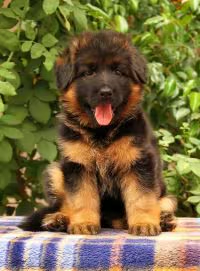
Swapnil Mumbai
Healthy, Adorable, and Loving GSD puppies with Swapnil, from Mumbai.
Whatsapp: +91 98607 77723
German Shepherd Coat Colors
The German Shepherd breed boasts a stunning array of coat colors that contribute to its distinctive and captivating appearance. While the classic black and tan coloration is perhaps the most well-known, German Shepherds exhibit a diverse palette of hues that add to their individuality and charm.
1. Black & Tan: The iconic black and tan combination is synonymous with the German Shepherd breed. The deep black saddle-like pattern over the back and the tan markings on the legs, chest, and face create a striking contrast that embodies the breed's elegance and strength.
2. Sable: Sable German Shepherds showcase a unique and captivating coat pattern. Ranging from light tan to rich mahogany, their fur is characterized by a darker overlay on the tips, creating a luxurious and dynamic appearance.
3. Black & Red: Similar to black and tan, the black and red coat color features a deep black saddle with vibrant red markings. This combination enhances the breed's regal presence and highlights their athletic build.
4. Black & Cream: The black and cream variation offers a softer contrast, with the dark black overlay complemented by creamy markings. This subtle interplay of colors adds a touch of elegance to the breed's aesthetics.
These distinct coat colors are often accompanied by various patterns, such as solid or saddle markings. While coat color does not affect the German Shepherd's intelligence, temperament, or capabilities, it contributes to their individual allure and charm.
As you embrace the beauty and diversity of the German Shepherd breed, remember that each color variation is a testament to their rich genetic heritage and remarkable adaptability. Whether you're drawn to the traditional black and tan or captivated by the striking sable, the German Shepherd's coat colors reflect the breed's enduring appeal and versatility.
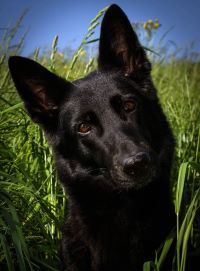
Black German Shepherd
Black GSDs are becoming very popular these days. Watching Black GSD puppies playing is quite a sight.
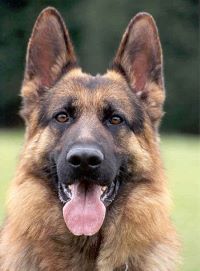
Black and Tan German Shepherd
Black and Tan German Shepherds are more commonly found.
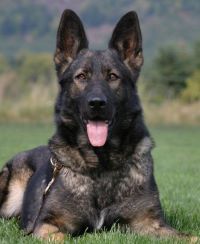
Sable German Shepherd
Probably how the original GSD looked. The Sable GSD coat is very luzurious looking.
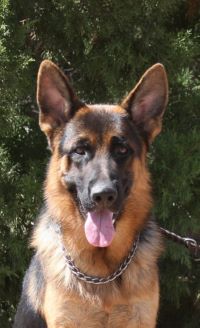
Black and Red German Shepherd
Black and Red German Shepherd have a deep red color that helps highlight the dog's athletic build.

Black and Cream German Shepherd
The black and cream variation offers a softer contrast.
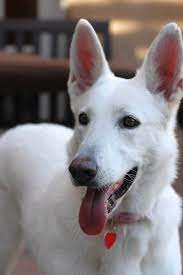
White German Shephered
White is not a recognized color in some kennel clubs, but nevertheless bred and admired by GSD lovers.
Physical attributes
Males stand 24 to 26 inches, and weigh 30 to 40 Kg.
Females stand 22 to 24 inches, and weigh 22 to 32 Kg.
Average life span of 10-14 years.
Personality
German Shepherds are loyal partners who show ability to learn and retain training for any given number of tasks. These bold and fighter attitude dogs, will excel at almost anything they are trained to do, and hence they often double up as military, police and service dogs. Their trainability and extreme loyalty commitment make them an excellent choice for any agenda. To prevent aggressive behavior from over guarding, these dogs should be pampered with generous socialization and obedience training from a young age, approximately from the age of 3 months.
Unlike other breeds such as Labrador, who are quick to please to get attention and affection, German shepherds do not give affection lightly. They are known for their dignity and are also known as ‘one-man’ breed for its likelihood to display fidelity towards its owner. German Shepherds get along well with children, and keeping up with their guarding instincts are cautious of strangers.
Health
German Shepherds are healthier dogs, but they require care and support catered to their needs. These fur-balls of love, dignity and loyalty, have less tolerance towards Indian heat and hence may develop skin issues. One of the primary skin diseases known in GSD are Mange, which are microscopic mites growing on the dogs fur.
As a result of poor breeding practice, one of the common illness among German Shepherds are hip and elbow dysplasia, which may cause pain in older dogs and may even lead to arthritis. The best ways to help prevent hip dysplasia in your dog is to keep them on a heathy diet, not strenuously exercising, and among other things is buying it from a responsible breeder.
German Shepherd Shedding
German Shepherds are renowned for their striking appearance and versatile capabilities, yet one aspect of their care that potential owners should be aware of is shedding. Shedding is a natural and common occurrence among many dog breeds, including German Shepherds, and understanding their shedding patterns can help you manage their coat and maintain a clean and comfortable living environment.
Shedding Season: German Shepherds have a double coat, consisting of a dense undercoat and a longer, coarser outer coat. They typically experience heavier shedding twice a year, known as "blowing their coat." This shedding usually occurs in the spring as they shed their winter undercoat, and again in the fall as they prepare for a new seasonal coat. During these periods, you can expect a significant increase in shedding as the old fur is replaced by new growth.
Regular Maintenance: To manage shedding, regular grooming is essential. Brushing your German Shepherd's coat several times a week helps remove loose fur and prevents it from accumulating around your home. Using a high-quality shedding brush or undercoat rake can be particularly effective in removing the loose undercoat during shedding seasons.
Daily Brushing: Daily brushing during shedding seasons can further reduce shedding and keep your home cleaner. This practice not only removes loose fur but also helps distribute the natural oils in your dog's coat, promoting a healthy shine and minimizing matting or tangling.
Diet and Health: A balanced and nutritious diet plays a role in the health of your German Shepherd's coat. Ensuring they receive appropriate nutrients, such as omega-3 fatty acids, can contribute to a healthy coat and skin, potentially reducing excessive shedding.
Managing Allergies: If anyone in your household has allergies, regular grooming and cleaning can help minimize allergens. Additionally, using a high-efficiency particulate air (HEPA) filter in your home can help reduce airborne allergens and improve indoor air quality.
Professional Grooming: Periodic visits to a professional groomer can help manage shedding and keep your German Shepherd's coat in optimal condition. Groomers can provide specialized treatments, such as de-shedding baths and furminator treatments, that help reduce shedding and keep your dog comfortable.
Embracing the Bond: While shedding may require some extra effort in terms of grooming and cleaning, it's important to remember that shedding is a natural part of owning a German Shepherd. Embrace the bond you share with your canine companion and view grooming sessions as opportunities to strengthen your connection and enhance their well-being.
By understanding and addressing shedding, you can ensure that your German Shepherd remains healthy, comfortable, and a cherished member of your family. With proper care and attention, you can manage shedding and enjoy the countless rewards of sharing your life with this remarkable breed.
Grooming and Caring for German Shepherds
Grooming and caring for your German Shepherd is a rewarding aspect of pet ownership that not only enhances their appearance but also contributes to their overall health and well-being. These intelligent and majestic dogs thrive when given the proper care, attention, and regular grooming they deserve.
Coat Care: German Shepherds have a distinctive double coat that requires regular maintenance. Brush their coat several times a week to prevent matting, remove loose fur, and distribute natural oils. During shedding seasons, such as spring and fall, daily brushing helps manage shedding and keeps their coat healthy.
Bathing: Bathe your German Shepherd as needed, typically every few months or when they become dirty or smelly. Use a gentle dog shampoo to avoid stripping their coat of essential oils. Be sure to thoroughly rinse to prevent skin irritation, and dry them completely to prevent moisture-related skin issues.
Ears and Eyes: Regularly check their ears for signs of infection, debris, or wax buildup. Clean them gently with a damp cloth or a veterinarian-recommended ear cleaner. Keep an eye on their eyes as well, wiping away any discharge and ensuring they appear clear and healthy.
Nail Care: Trim their nails every few weeks to prevent overgrowth and discomfort. Be cautious not to cut too close to the quick, which can cause bleeding. If you're unsure or uncomfortable trimming their nails yourself, seek the assistance of a professional groomer or veterinarian.
Teeth and Oral Health: Brush your German Shepherd's teeth regularly to prevent dental issues. Use a dog-friendly toothbrush and toothpaste. Dental chews and toys can also help maintain oral hygiene and reduce tartar buildup.
Exercise and Mental Stimulation: Engage your German Shepherd in regular physical exercise and mental stimulation. Daily walks, playtime, and interactive toys help keep them physically fit and mentally sharp. Their intelligence thrives on challenges and activities that stimulate their problem-solving skills.
Training and Socialization: Start training and socialization early to ensure a well-behaved and confident German Shepherd. Positive reinforcement methods work best, and consistency is key. Expose them to various environments, people, and situations to promote a well-adjusted and friendly demeanor.
Diet and Nutrition: Provide a balanced and nutritious diet that meets your German Shepherd's specific needs. Consult your veterinarian for recommendations on portion sizes and the best food options for their age, size, and activity level.
Health Checkups: Regular veterinary checkups are essential to monitor your German Shepherd's overall health and address any potential issues promptly. Stay up-to-date on vaccinations, parasite prevention, and dental care.
Emotional Bond: Building a strong emotional bond with your German Shepherd is crucial. Spend quality time together, offer affection, and create a safe and loving environment where they feel secure and cherished.
By dedicating time and attention to grooming and caring for your German Shepherd, you're not only ensuring their physical well-being but also fostering a deep and meaningful connection that enriches both your lives. The effort you invest in their care is rewarded with the boundless love, loyalty, and companionship of this remarkable breed.
Socializing and Training German Shepherds
Socializing and training your German Shepherd are essential steps to nurturing a well-behaved, confident, and balanced canine companion. These intelligent and versatile dogs thrive in environments where they receive proper guidance, positive experiences, and the opportunity to develop their innate skills.
Start Early: Begin socialization and training during puppyhood to establish a strong foundation. Early exposure to various people, animals, environments, and situations helps prevent behavior problems and promotes a well-adjusted adult dog.
Positive Reinforcement: Use positive reinforcement methods, such as treats, praise, and rewards, to encourage desired behaviors. Avoid harsh or punitive training techniques, as they can harm the bond between you and your German Shepherd and lead to anxiety or fear-based responses.
Basic Commands: Teach essential commands like sit, stay, come, down, and leash walking. Consistent practice and repetition help reinforce these commands, making them reliable tools for communication and control in different situations.
Leash Training: Proper leash training is crucial for managing your German Shepherd's behavior in public spaces. Teach them to walk calmly on a leash, without pulling, lunging, or reacting aggressively to other dogs or distractions.
Behavioral Socialization: Expose your German Shepherd to a variety of experiences, such as meeting new people, other dogs, and different environments. Gradually introduce them to novel situations, sounds, and stimuli to build their confidence and reduce the likelihood of fear or aggression.
Canine Interactions: Arrange safe playdates with other well-socialized dogs to help your German Shepherd learn appropriate social cues and behaviors. Supervise interactions and ensure a positive and controlled environment for positive experiences.
Obedience Training: Enroll your German Shepherd in formal obedience classes or work with a professional dog trainer. These classes provide structured learning opportunities and help refine their obedience skills in a controlled setting.
Mental Stimulation: Challenge your German Shepherd's intelligence with puzzle toys, interactive games, and training exercises. Mental stimulation is as important as physical exercise and helps prevent boredom-related behavior issues.
Consistency and Patience: Consistency is key in training and socializing your German Shepherd. Be patient, as learning takes time. Celebrate small successes and maintain a positive attitude, even in the face of challenges.
Bonding and Trust: Building a strong bond based on trust, respect, and communication is at the core of effective training and socialization. Spend quality time together, offer affection, and establish yourself as a reliable and supportive leader.
Professional Guidance: If you encounter specific behavioral challenges or need guidance, seek assistance from a certified dog trainer or behaviorist. They can provide personalized strategies and solutions to address any issues.
Socializing and training your German Shepherd not only shapes their behavior but also strengthens the unique bond you share. By investing time, patience, and positive interactions, you're nurturing a confident, well-mannered, and joyful companion that enriches your life and becomes a cherished member of your family.
Dog Sports for German Shepherds
German Shepherds are renowned for their intelligence, athleticism, and versatility, making them excellent candidates for various dog sports. Engaging in these activities not only channels their energy but also strengthens the bond between you and your furry companion. Here are some exciting dog sports that German Shepherds excel in:
1. Schutzhund/IPO: As mentioned earlier, Schutzhund (now known as IPO) is a comprehensive sport that assesses a dog's tracking, obedience, and protection skills. German Shepherds, with their innate intelligence and work ethic, often excel in this demanding and disciplined sport. It provides mental and physical stimulation while enhancing the dog's capabilities and responsiveness to commands.
2. Agility: Agility courses challenge a dog's agility, speed, and coordination as they navigate through obstacles such as jumps, tunnels, weave poles, and ramps. German Shepherds' athleticism and willingness to learn make them natural contenders in agility competitions, where they showcase their ability to follow cues and maneuver through courses with precision.
3. Canine Freestyle: Also known as "dog dancing," canine freestyle combines obedience, tricks, and choreographed movements set to music. German Shepherds' intelligence and trainability make them fantastic partners in this creative sport, where they demonstrate their ability to follow cues and perform captivating routines that showcase their unique personalities.
4. Rally Obedience: Rally Obedience is a sport that focuses on teamwork between the dog and the handler as they navigate a course with a series of obedience exercises. German Shepherds' aptitude for obedience and their desire to please their handler make them well-suited for this activity, where clear communication and precise execution are key.
5. Nose Work: Nose work taps into a dog's incredible sense of smell as they search for specific scents hidden in various environments. German Shepherds, with their strong noses and tracking instincts, excel in nose work activities. It provides mental stimulation, enhances their focus, and engages their natural abilities.
6. Flyball: Flyball is a relay race where teams of dogs must leap over hurdles, trigger a ball-release mechanism, catch a tennis ball, and then race back. German Shepherds' agility, speed, and drive make them valuable assets in flyball teams, showcasing their determination and athleticism.
7. Dock Diving: In dock diving, dogs leap off a dock into a pool of water, competing for distance or height. German Shepherds' strong build and love for physical challenges can lead them to excel in this exciting water sport, which combines athleticism and a sense of adventure.
8. Tracking: Leveraging their exceptional sense of smell, German Shepherds thrive in tracking sports, where they follow scent trails to locate hidden items or navigate intricate paths. This sport hones their natural tracking instincts and stimulates their minds as they decipher scents and navigate terrain.
Engaging in dog sports not only keeps your German Shepherd physically active but also taps into their natural abilities and strengthens your bond. Before participating in any sport, ensure your dog's physical condition and consult with trainers or experts to determine the best fit for their personality and skills. Whether it's the precision of obedience, the excitement of agility, or the creativity of canine freestyle, there's a dog sport perfectly suited to showcase the remarkable talents of your German Shepherd.
What is Schutzhund?
Schutzhund, pronounced as "shutts-hoond," is a demanding and multifaceted dog sport that originated in Germany. Originally developed in the early 20th century as a way to assess and evaluate the working abilities of German Shepherd dogs, Schutzhund has evolved into a comprehensive test of a dog's skills, training, and temperament.
Three Phases of Schutzhund:
- Tracking: In this phase, the dog is tested on its ability to follow a scent trail left by a human. The handler and the dog must navigate through a designated track, indicating the dog's keen sense of smell, focus, and tracking skills.
- Obedience: The obedience phase evaluates the dog's responsiveness to commands and its ability to perform a series of exercises, including heeling, recalls, retrieves, and staying in different positions. The dog's willingness to work with its handler and exhibit precise obedience is assessed.
- Protection: The protection phase assesses the dog's courage, confidence, and control during various scenarios. The dog must demonstrate its ability to apprehend and hold a "threatening" person under the handler's command, as well as show controlled aggression and a strong protective instinct.
Training and Purpose:
Schutzhund training is rigorous and requires a deep bond between the dog and its handler. It emphasizes discipline, teamwork, and a strong work ethic. While Schutzhund was initially developed to evaluate the suitability of German Shepherds for police and military work, it has also become a competitive sport enjoyed by dog enthusiasts around the world.
Participating in Schutzhund provides numerous benefits, including enhancing the dog's physical and mental capabilities, improving obedience and control, and strengthening the partnership between the handler and the dog. While not every German Shepherd is destined for Schutzhund competition, the principles of training, discipline, and communication it promotes can be applied to various aspects of a dog's life.
Final Thoughts:
Schutzhund is a challenging and respected dog sport that showcases the remarkable abilities of German Shepherds. It celebrates their intelligence, versatility, and dedication to working alongside humans. Whether pursued as a competitive endeavor or as a means of enhancing a dog's skills and temperament, Schutzhund remains a testament to the enduring partnership between humans and their loyal and capable canine companions.
Most Popular German Shepherd Dogs
The German Shepherd Dog, known for its intelligence, loyalty, and versatility, has captured the hearts of dog enthusiasts around the world. Throughout history, several German Shepherds have gained immense popularity and left a lasting legacy. Here are some of the most renowned and beloved German Shepherds:
1. Rin Tin Tin: One of the most iconic German Shepherds in history, Rin Tin Tin rose to fame during the silent film era. Discovered as a puppy on a World War I battlefield, Rin Tin Tin starred in numerous films, captivating audiences with his intelligence and captivating performances. His legacy continues to influence the breed's popularity and reputation.
2. Strongheart: Another trailblazing German Shepherd of the film industry, Strongheart, was known for his roles in early Hollywood movies. He helped popularize the breed and contributed to its recognition as a talented and versatile working dog.
3. Buddy: The first guide dog trained by Dorothy Eustis, Buddy, set the foundation for service dogs and guide dog programs. His success in assisting visually impaired individuals showcased the breed's exceptional intelligence, loyalty, and willingness to assist humans in various capacities.
4. Hektor Linksrhein: Often referred to as the founding father of the modern German Shepherd breed, Hektor Linksrhein played a pivotal role in establishing the breed's standards and characteristics. He served as the breed's initial foundation and contributed to the development of the German Shepherd as we know it today.
5. Strongheart: Another trailblazing German Shepherd of the film industry, Strongheart, was known for his roles in early Hollywood movies. He helped popularize the breed and contributed to its recognition as a talented and versatile working dog.
6. Max von Stephanitz: Regarded as the father of the German Shepherd breed, Max von Stephanitz played a key role in shaping the breed's early development. He recognized the breed's potential for intelligence, versatility, and loyalty, and his efforts in establishing breed standards and promoting responsible breeding practices have left an indelible mark on the breed's history.
7. Horand von Grafrath: The first dog officially registered as a German Shepherd, Horand von Grafrath, holds a significant place in the breed's lineage. As one of the foundation dogs, his descendants played a crucial role in the breed's progression and popularity.
8. Roy Rogers' Bullet: Known as the "wonder dog," Bullet gained fame as the faithful companion of cowboy actor Roy Rogers. With his appearances in films, television shows, and personal appearances, Bullet showcased the breed's versatility and endearing qualities to a wide audience.
9. A German Shepherd in the White House: Several German Shepherds have called the White House home, showcasing the breed's status as a beloved and trusted companion. Notable examples include Buddy (President Clinton's pet) and Major and Champ (President Biden's pets).
10. Contemporary Heroes: In recent times, German Shepherds have continued to make their mark as search and rescue dogs, police and military working dogs, therapy dogs, and service dogs. Their unwavering loyalty, intelligence, and versatility continue to make them popular choices for various roles and responsibilities.
These iconic German Shepherds have left an indelible impact on the breed's history and popularity. Their intelligence, loyalty, and remarkable abilities have contributed to the enduring admiration and respect that German Shepherds enjoy among dog enthusiasts worldwide.
German Shepherds in Movies
German Shepherds have not only captured hearts as loyal and versatile companions but have also graced the silver screen with their intelligence, presence, and captivating performances. Their remarkable abilities and distinctive appearance have made them popular choices for various roles in movies and television shows. Here are some memorable instances of German Shepherds shining in the world of entertainment:
1. Rin Tin Tin: One of the most iconic canine stars in cinematic history, Rin Tin Tin achieved stardom during the silent film era. His intelligence and expressive nature allowed him to excel in a range of roles, from heroic rescues to heartwarming stories. Rin Tin Tin's legacy paved the way for other German Shepherds in the entertainment industry.
2. Strongheart: Another notable German Shepherd actor, Strongheart, captivated audiences with his compelling performances. He starred in multiple films, demonstrating his versatility and ability to convey a wide range of emotions through his expressions and actions.
3. Max von Stephanitz: While not an actor, Max von Stephanitz, the founder of the German Shepherd breed, played a crucial role in the early film industry's recognition of the breed's potential. His promotion of the breed's intelligence and versatility contributed to German Shepherds' popularity in film and their ability to take on various roles.
4. K-9 Companions: German Shepherds have portrayed loyal and dedicated K-9 officers in police and detective movies. Their roles often involve tracking down criminals, sniffing out clues, and showcasing their incredible scent detection abilities.
5. Heroic Roles: German Shepherds have portrayed heroic characters in action and adventure films, often assisting protagonists in overcoming challenges and adversaries. Their bravery, loyalty, and determination add depth to the narratives and create emotional connections with audiences.
6. Family Favorites: German Shepherds have been featured in family-friendly movies, charming audiences with their endearing antics and heartwarming interactions. Their role as loving companions and protectors adds warmth and relatability to these stories.
7. Animated Delights: Even in the realm of animation, German Shepherds have left their mark. Animated films and series have portrayed these dogs in various roles, showcasing their intelligence and playful personalities in both comedic and heart-tugging scenarios.
8. Partnerships in Action: German Shepherds have been cast as partners to protagonists in action-packed movies, forming dynamic duos that showcase teamwork, loyalty, and the strong bond between humans and dogs.
9. Inspirational Tales: German Shepherds have starred in inspirational stories that highlight their resilience, determination, and ability to overcome challenges. These tales underscore the breed's unwavering spirit and the power of their connections with humans.
10. Endearing Companions: Whether in heartwarming dramas or light-hearted comedies, German Shepherds have portrayed endearing companions that bring joy and companionship to characters' lives, leaving lasting impressions on audiences.
German Shepherds' presence on the silver screen reflects their remarkable qualities and versatility, allowing them to take on a diverse range of roles that capture the hearts of moviegoers. Their intelligence, loyalty, and expressive nature continue to make them beloved and unforgettable stars in the world of entertainment.
Differences Between German Shepherds and Belgian Malinois
German Shepherds and Belgian Malinois are two distinct breeds of working dogs, each with its own unique characteristics and traits. While they share some similarities, they also have notable differences that set them apart. Here's a closer look at how to identify these two breeds and why they can sometimes be mistaken for one another:
Physical Appearance: German Shepherds are known for their larger size, strong build, and distinctive double coat. They have a noble and confident appearance, with erect ears and a bushy tail. On the other hand, Belgian Malinois are slightly smaller and more compact, with a sleeker body and shorter coat. Their ears are often more pointed and erect, and their tail is typically longer.
Coat and Colors: German Shepherds have a dense double coat that can come in various color combinations, including black and tan, sable, and solid black. Belgian Malinois have a short, straight coat that is typically fawn to mahogany in color with a black mask and overlay.
Temperament and Behavior: German Shepherds are known for their versatility, intelligence, and loyalty. They are often used as police and service dogs due to their trainability and protective nature. Belgian Malinois are highly energetic, driven, and excel in various dog sports and working roles. They are known for their agility and enthusiasm.
Work Ethic: Both breeds have strong work ethics, but Belgian Malinois are often regarded as more intense and high-energy. They thrive on mental and physical stimulation and require active engagement to channel their energy positively.
Training and Socialization: German Shepherds are known for their adaptability and can be more forgiving of handling mistakes during training. Belgian Malinois require precise and consistent training due to their high drive and sensitivity. Socialization is essential for both breeds to ensure they develop well-rounded and confident personalities.
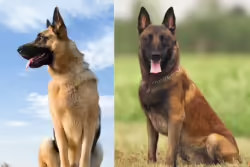
German Shepherds are usually confused with Belgian Malinois, who are generally more lean and atheletic.
Mistaken Identity: German Shepherds and Belgian Malinois can sometimes be mistaken for each other due to their similar roles in law enforcement and their shared traits. However, close observation reveals the differences in size, coat texture, coloration, and body proportions. The Belgian Malinois' sleeker build and shorter coat are key identifiers.
Choosing the Right Breed: When considering a German Shepherd or a Belgian Malinois as a companion, it's essential to assess your lifestyle, activity level, and preferences. German Shepherds may be better suited for families seeking a loyal and versatile companion, while Belgian Malinois may be a great fit for active individuals looking for an energetic and driven working partner.
While German Shepherds and Belgian Malinois share some similarities, their distinct physical characteristics, temperaments, and roles make them unique breeds. By understanding their differences and choosing the breed that aligns with your lifestyle and goals, you can welcome a devoted and capable canine companion into your life.
German Shepherds for First-Time Owners
Welcoming a German Shepherd into your home as a first-time owner can be a rewarding and fulfilling experience, provided you are prepared to meet their unique needs and characteristics. While German Shepherds are known for their intelligence, loyalty, and versatility, they also require dedicated care, training, and attention. Here's what first-time owners should consider when bringing a German Shepherd into their lives:
Research and Preparation: Before bringing a German Shepherd home, take the time to research the breed thoroughly. Understand their characteristics, exercise requirements, grooming needs, and potential health concerns. Being well-informed will help you provide the best care and create a strong bond with your new companion.
Training and Socialization: German Shepherds are highly intelligent and trainable dogs, making them suitable for first-time owners who are committed to consistent and positive training methods. Early socialization is crucial to help your German Shepherd develop good manners, adaptability, and confidence around people, animals, and various environments.
Exercise and Mental Stimulation: German Shepherds are active and energetic dogs that thrive on physical activity and mental challenges. Plan for daily exercise routines, including walks, playtime, and interactive games to keep your dog mentally and physically stimulated. Without adequate stimulation, they may become bored and exhibit undesirable behaviors.
Grooming and Maintenance: German Shepherds have a double coat that sheds throughout the year, with heavier shedding during seasonal changes. Regular grooming, including brushing to manage shedding, nail trimming, and ear cleaning, is essential to keep your dog healthy and comfortable. Be prepared for occasional baths to maintain their coat's cleanliness.
Healthcare and Nutrition: Regular veterinary check-ups, vaccinations, and preventive care are essential to ensure your German Shepherd's well-being. Consult your veterinarian to establish a balanced and nutritious diet suitable for your dog's age, activity level, and health requirements.
Living Environment: German Shepherds are adaptable and can thrive in various living situations, including apartments or houses with yards. However, they require ample space to move and play. A secure fence is necessary to prevent wandering, as their protective instincts may lead them to explore beyond your property.
Time and Commitment: German Shepherds are known for their strong bonds with their owners and thrive on companionship. Be prepared to spend quality time with your dog, provide mental and physical stimulation, and offer the love and attention they need to flourish as a loyal and devoted member of your family.
Consider Professional Guidance: As a first-time owner, seeking guidance from experienced trainers or joining obedience classes can greatly benefit you and your German Shepherd. Professional advice can help you build a strong foundation for training, socialization, and overall well-being.
Owning a German Shepherd as a first-time owner can be an enriching experience filled with companionship, learning, and shared adventures. By committing to their care, training, and well-being, you'll create a lasting bond and enjoy the rewards of having a devoted and intelligent canine companion by your side.
Feeding German Shepherds
There are four key ingredients that go into providing a safe environment to dogs. These include a warm home, food, exercise and play, and care. You must feed your dog twice a day with high quality dog food. As pet owners, it your responsibility to ensure they get the just the right amount of nutrition. Overfeeding and weigh gain can lead to joint problems, hence ensure to limit treats and regulate exercise and food.
If you plan on giving homemade dog food, make sure to supplement with meat and veggies, such as boiled eggs, carrots etc. For adult German Shepherds, a minimum of 26% protein is recommended. Other sources of protein can come from mutton or chicken.
For home cooked food you can prepare an excellent portion of greens using baby carrots, beets, spinach, beans, rice, potatoes, yogurt, fruits eggs and meat.
GSDs are best fed when they are fed just correctly.
Dog food for German Shepherds should be free of harsh ingredients and any artificial flavors, colors and preservatives, or animal byproducts. Recipes that are comprised of these types of ingredients can have adverse effects on overall health and well being of your dog. Hence make sure you only serve high quality dog food.
Given the popularity of German Shepherds, one can easily find a puppy or a grown up dog easy to adopt from your network. Alldogs.in recommends one always considers adopting from someone who is struggling to meet the pet's needs before considering taking home a new puppy.
Fun Facts About German Shepherds
German Shepherds are not only known for their intelligence and versatility, but they also boast a rich history and unique characteristics that make them stand out in the canine world. Here are some fun and fascinating facts about these remarkable dogs:
1. Origin and Name: German Shepherds, as the name suggests, originated in Germany in the late 19th century. They were initially bred as herding dogs and were later recognized for their exceptional working abilities in various fields.
2. Noble Appearance: German Shepherds are known for their confident and noble appearance, which contributes to their popularity as both working dogs and loyal companions. Their erect ears, bushy tails, and alert expressions give them a distinctive and regal presence.
3. Versatility in Roles: German Shepherds excel in numerous roles, including police and military work, search and rescue, guide and service dogs for people with disabilities, and therapy dogs. Their versatility is a testament to their intelligence and adaptability.
4. Canine Actors: German Shepherds have left an indelible mark on the entertainment industry. They have appeared in a variety of movies, TV shows, and commercials, captivating audiences with their expressive faces and remarkable performances.
5. Einstein's Furry Friend: The famous physicist Albert Einstein had a beloved German Shepherd named "Chico." Einstein was often seen walking and playing with Chico, highlighting the breed's popularity even among esteemed figures.
6. Sensory Superstars: German Shepherds possess an exceptional sense of smell, making them valuable assets in detection and scent-based roles. They have been employed in locating explosives, drugs, and even missing persons.
7. Loyal Companions: German Shepherds are renowned for their loyalty and strong bonds with their families. They are often protective of their loved ones and make excellent watchdogs, alerting owners to potential dangers.
8. Health and Longevity: With proper care, German Shepherds can live a long and healthy life. Their average lifespan ranges from 10 to 13 years, and regular exercise, a balanced diet, and routine veterinary care contribute to their well-being.
9. Canine Heroes: German Shepherds have earned their reputation as heroes in various real-life scenarios. They have saved lives by alerting authorities to danger, assisting in disaster relief efforts, and providing comfort and support to those in need.
10. Intelligence and Problem-Solving: German Shepherds are among the most intelligent dog breeds, known for their problem-solving skills and ability to quickly learn new commands and tasks. This trait makes them a joy to train and interact with.
These fun facts highlight the remarkable qualities and rich history of German Shepherds. Whether serving as working dogs, loyal companions, or captivating entertainers, German Shepherds continue to leave an indelible paw print on the hearts of dog lovers around the world.
German Shepherd - Frequently Asked Questions
Are you curious about German Shepherds? Here are some commonly asked questions and answers to help you gain a better understanding of this remarkable breed:
1. What is the origin of the German Shepherd breed?
German Shepherds originated in Germany in the late 19th century. They were developed through careful breeding to excel as herding dogs, combining intelligence, agility, and strength.
2. What is the temperament of German Shepherds?
German Shepherds are known for their loyalty, intelligence, and versatility. They are often described as confident, obedient, and trainable. Their protective nature makes them excellent watchdogs and loyal companions.
3. How much exercise do German Shepherds need?
German Shepherds are active and energetic dogs that require regular exercise to keep them mentally and physically stimulated. They benefit from daily walks, playtime, and engaging activities to prevent boredom and promote overall well-being.
4. Do German Shepherds shed a lot?
Yes, German Shepherds do shed throughout the year, with heavier shedding during seasonal changes. Regular grooming, including brushing, can help manage shedding and keep their coat healthy.
5. Are German Shepherds good with children?
German Shepherds can be excellent family dogs when properly socialized and trained. They are often protective of children and can form strong bonds with them. Supervision and teaching children how to interact with dogs safely are essential.
6. Are German Shepherds good guard dogs?
Yes, German Shepherds are known for their protective instincts and make excellent guard dogs. They are attentive and alert, making them effective at alerting their owners to potential threats.
7. Are German Shepherds good for first-time dog owners?
German Shepherds can be suitable for first-time owners who are committed to providing proper training, socialization, and care. However, their intelligence and energy require dedicated time and effort to ensure they thrive in their new home.
8. How can I train my German Shepherd?
Positive reinforcement training methods work well with German Shepherds. Consistent training, socialization, and mental stimulation are essential for a well-behaved and obedient dog. Enrolling in obedience classes or seeking guidance from professional trainers can be beneficial.
9. Do German Shepherds have any health concerns?
German Shepherds can be prone to certain health issues, including hip and elbow dysplasia, degenerative myelopathy, and digestive problems. Regular veterinary care, a balanced diet, and appropriate exercise can help maintain their health and well-being.
10. Can German Shepherds live in apartments?
While German Shepherds have adaptable personalities, they thrive best in environments with ample space for exercise and play. If living in an apartment, ensure you provide sufficient physical activity and mental stimulation to meet their needs.
These frequently asked questions offer insights into various aspects of owning and caring for a German Shepherd. As you embark on your journey with this remarkable breed, understanding their characteristics, needs, and traits will help you build a strong and rewarding bond with your canine
Considering featuring your story with your German Shepherd? Get in touch with us at AllDogs.in
For more information about pets and how alldogs.in can help you, please drops us a note at AllDogs.in

